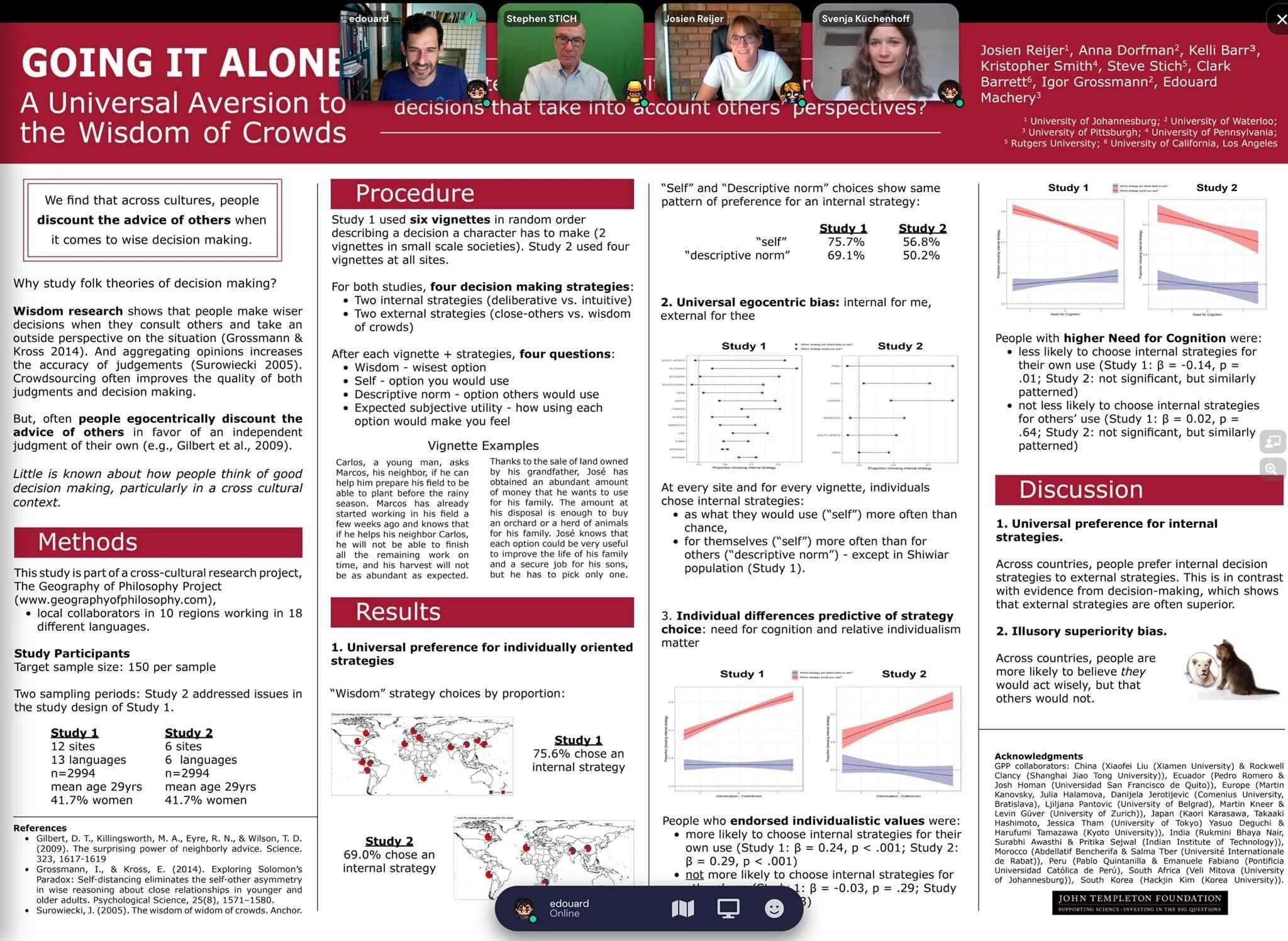Are concepts of knowledge, wisdom, and understanding universal across demographics? Learn about the global effort to explore diversity outside of the Western tradition of philosophy.
Join the GPP Conference
The Geography of Philosophy Project (GPP) is celebrating the conclusion of its investigation into the themes of Knowledge, Wisdom, and Understanding with a final conference on October 13-15, 2022. Register to join online.
Final Conference Announced for October 2022
The Final Conference celebrating the conclusion of the Geography of Philosophy Project is set for October 2022 at the University of Pittsburgh. Learn more at Final Conference 2022.
A New Approach to Philosophy
Ny Vasil on Covid-19 and misinformation
Ny Vasil presents at CogSci 2021 on COVID-19 and misinformation: https://www.youtube.com/watch?v=coADiwwb7TA
Geography of Philosophy Project extended through December 2022
The Geography of Philosophy Project, an in depth, cross-cultural exploration of the concepts of knowledge, understanding and wisdom, has been extended. The Project, which receives major funding from the John Templeton Foundation, is conducting studies on five continents, using a wide range of methods. Though originally scheduled to end in May 2021, the John Templeton Foundation has extended the Project through December 2022. The Foundation has also provided generous additional funding (by $546,777 from $2,569,563 to $3,116,340) that will enable Project teams around the world to transition to online data collection and continue the Project’s cutting edge, in depth studies, despite the disruptions caused by the global Covid-19 pandemic. The Project PIs—Clark Barrett, Edouard Machery, and Steve Stich—and the international Team Leaders are enormously grateful to the John Templeton Foundation President, Heather Templeton Dill, and to the Foundation’s dedicated staff for their ongoing support of research inspired by Sir John Templeton’s conviction that all intellectual traditions would be enriched by deep exploration of fundamental philosophical concepts in cultures around the world.
Clark Barrett (UCLA, Anthropology), Edouard Machery (Pittsburgh, HPS), and Steve Stich (Rutgers, Philosophy), PIs of the Geography of Philosophy Project.
Get to know the PIs
Go Philosophy features introductions to the PIs
Edouard Machery, Clark Barrett, and Stephen Stich write posts describing how their work shapes the development and practice of experimental philosophy, and how experimental philosophy shapes their work. Please read a preview below:
University of Pittsburgh
“I have been very involved in the development of experimental philosophy. … Independently of the philosophical upshots of the cross-cultural research on philosophical concepts, this interdisciplinary research is intrinsically fascinating. Identifying universal aspects of concepts such as the concepts of knowledge or wisdom tells us something about human nature, about the way human beings structure their experience. Variation tells us something about the diversity of ways in which human beings can navigate their social world. Finally, doing interdisciplinary work is essential to philosophy: It ties philosophy to important and substantial matters and prevents it from losing itself in empty theorizing.”
Rutgers University
“I am the oldest PI of the Geography of Philosophy Project (GPP) – old enough to have young grandchildren. … Starting in 2000, my students and I were leaders in the creation of the new field of “experimental philosophy” which uses the methods of psychology and neuroscience to evaluate the claims of philosophical theories and assess the evidence offered for those claims. The experimental philosophy movement has now generated over 1000 papers, and has come in second in a poll of “currently hot topics” that “ought to fade away” according to readers of Brian Leiter’s Philosophy Blog. During the last fifteen years, a substantial part of my work has been focused on empirically informed moral psychology.”
University of California, Los Angeles
“The three PIs of the Geography of Philosophy Project include two philosophers and an anthropologist; I’m the anthropologist. My work has long engaged with philosophical questions concerning the nature of human thinking and its evolutionary, cultural, developmental, and linguistic dimensions. … My empirical work has also engaged philosophical questions about the mind, including similarities and differences in concepts and their development across cultures, the nature of human social cognition, and recently, work in experimental philosophy including work on the role of intentions and other mental states in moral judgments across cultures.”
Read more at https://go-philosophy.com/.






